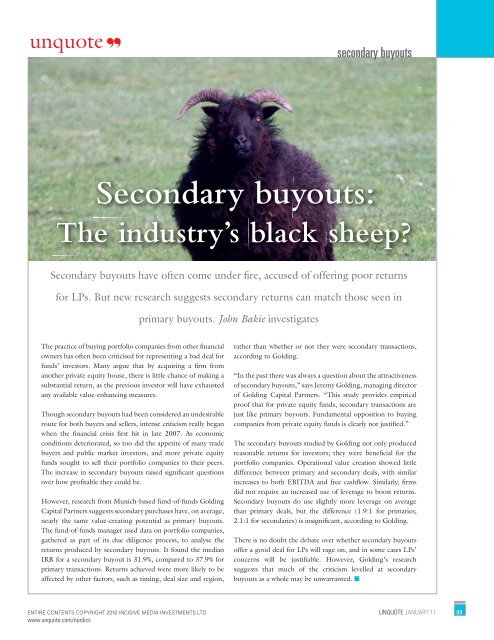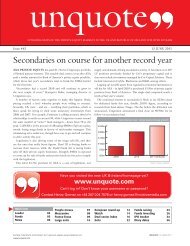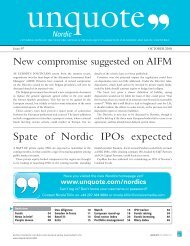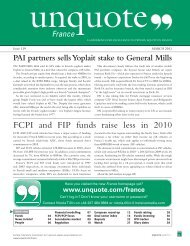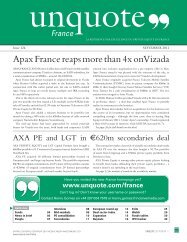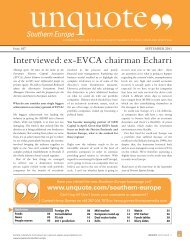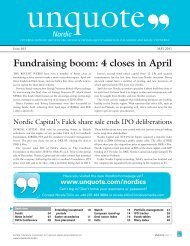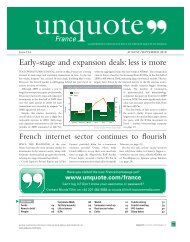latest digital edition of Nordic unquote
latest digital edition of Nordic unquote
latest digital edition of Nordic unquote
Create successful ePaper yourself
Turn your PDF publications into a flip-book with our unique Google optimized e-Paper software.
<strong>unquote</strong><br />
secondary buyouts<br />
Secondary buyouts:<br />
The industry’s black sheep?<br />
Secondary buyouts have <strong>of</strong>ten come under fire, accused <strong>of</strong> <strong>of</strong>fering poor returns<br />
for LPs. But new research suggests secondary returns can match those seen in<br />
primary buyouts. John Bakie investigates<br />
The practice <strong>of</strong> buying portfolio companies from other financial<br />
owners has <strong>of</strong>ten been criticised for representing a bad deal for<br />
funds’ investors. Many argue that by acquiring a firm from<br />
another private equity house, there is little chance <strong>of</strong> making a<br />
substantial return, as the previous investor will have exhausted<br />
any available value-enhancing measures.<br />
Though secondary buyouts had been considered an undesirable<br />
route for both buyers and sellers, intense criticism really began<br />
when the financial crisis first hit in late 2007. As economic<br />
conditions deteriorated, so too did the appetite <strong>of</strong> many trade<br />
buyers and public market investors, and more private equity<br />
funds sought to sell their portfolio companies to their peers.<br />
The increase in secondary buyouts raised significant questions<br />
over how pr<strong>of</strong>itable they could be.<br />
However, research from Munich-based fund-<strong>of</strong>-funds Golding<br />
Capital Partners suggests secondary purchases have, on average,<br />
nearly the same value-creating potential as primary buyouts.<br />
The fund-<strong>of</strong>-funds manager used data on portfolio companies,<br />
gathered as part <strong>of</strong> its due diligence process, to analyse the<br />
returns produced by secondary buyouts. It found the median<br />
IRR for a secondary buyout is 31.9%, compared to 37.9% for<br />
primary transactions. Returns achieved were more likely to be<br />
affected by other factors, such as timing, deal size and region,<br />
rather than whether or not they were secondary transactions,<br />
according to Golding.<br />
“In the past there was always a question about the attractiveness<br />
<strong>of</strong> secondary buyouts,” says Jeremy Golding, managing director<br />
<strong>of</strong> Golding Capital Partners. “This study provides empirical<br />
pro<strong>of</strong> that for private equity funds, secondary transactions are<br />
just like primary buyouts. Fundamental opposition to buying<br />
companies from private equity funds is clearly not justified.”<br />
The secondary buyouts studied by Golding not only produced<br />
reasonable returns for investors; they were beneficial for the<br />
portfolio companies. Operational value creation showed little<br />
difference between primary and secondary deals, with similar<br />
increases to both EBITDA and free cashflow. Similarly, firms<br />
did not require an increased use <strong>of</strong> leverage to boost returns.<br />
Secondary buyouts do use slightly more leverage on average<br />
than primary deals, but the difference (1.9:1 for primaries;<br />
2.1:1 for secondaries) is insignificant, according to Golding.<br />
There is no doubt the debate over whether secondary buyouts<br />
<strong>of</strong>fer a good deal for LPs will rage on, and in some cases LPs’<br />
concerns will be justifiable. However, Golding’s research<br />
suggests that much <strong>of</strong> the criticism levelled at secondary<br />
buyouts as a whole may be unwarranted. <br />
ENTIRE CONTENTS COPYRIGHT 2010 INCISIVE MEDIA INVESTMENTS LTD UNQUOTE JANUARY 11 09<br />
www.<strong>unquote</strong>.com/nordics


